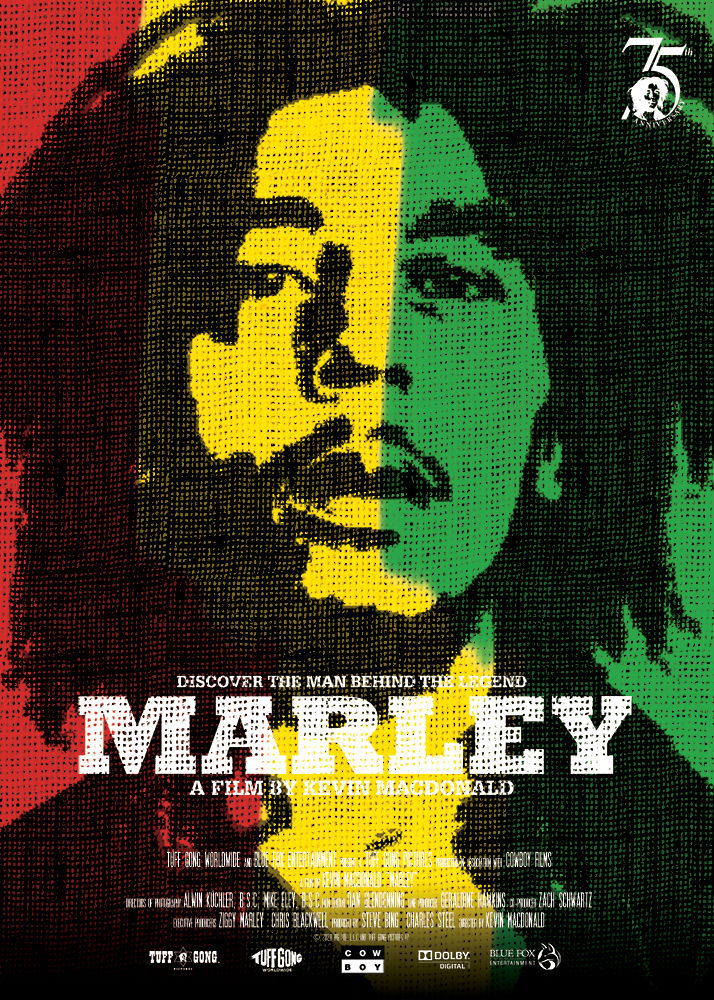Review: 'Marley'
- Drew Moniot

- Jul 29, 2020
- 3 min read

July 31st would have been Bob Marley’s 75th birthday.
In his honor and remembrance, Kevin Macdonald’s 2012 documentary Marley is being re-released in virtual and traditional cinemas.
It’s an in-depth look at Bob Marley’s life: his music, his politics, his religion and of course, his astonishing personal life.

He was born into poverty February 6, 1945 in Nine Miles Jamaica.
By the time he died in Miami Florida on May 11, 1981 at the age of just 36, he had risen to world-wide fame.
Marley traces his life story beginning with his early youth growing up in a corrugated steel shack where he spent his childhood, playing make-shift home-made instruments out of wooden boxes and wire.
Early on, he realized that his guitar and his raw musical talent would be his only means of escape.
While filming the feature film The Last King of Scotland on location in Uganda in 2006, director Kevin Macdonald would often see Bob Marley posters and was inspired by his lasting popularity.
What resulted is a 2-hour, 24-minute documentary consisting of musical concerts, documentary footage and interviews with Marley’s friends, family and bandmates from his band The Wailers.

The movie runs long, and feels long and drawn out, particularly in the first 30 minutes or so, which focus on backstory and set-up.
It establishes Marley’s mixed heritage which caused him to feel like an outsider and outcast throughout his life.
His father, Norvel Marley. was a British naval captain who was 59 when he married Bob’s Jamaican mother who was 18.
The film contains extensive interviews, some of which are subtitled for the sake of clarity and understandability.
It might have been used even more extensively due to the difficulty in deciphering the Jamaican dialect. It’s a minor complaint.
On the positive side, Bob Marley fans will love the depth of the film.
It offers insight into the Rastafarian influences that shaped his life and his music, as well as the violent political climate that caused him to become the rebel that inspired so many oppressed people on a global scale.
Bob Marley was an original. He forged the very signature sound of reggae music.
His bandmates explain the interplay between the choppy guitar rhythm and the syncopated bass lines and drumbeats that made his songs so distinctively different and instantly recognizable.
His songs meant something to the masses. Like The Beatles, he sang of peace and love.
He also sang about political conflict and the importance of standing up for one’s rights.
Marley’s fame burned hot.

Narrowly escaping a shooting that left scars across his torso that he proudly displayed to his adoring fans onstage a few hours later, he was aware that his turbulent life might be cut short.
He was driven, and worked tirelessly.
His friends claimed that he would only sleep four hours a night.
Like so many rock stars, there were a legion of female admirers.

In addition to the four biological children and two adopted daughters he had with his lifelong wife Rita, he reportedly had a total of 11 children with multiple women.
He even captured the heart of the reigning Miss World Beauty Contest (1976) who fell victim to his athletic physique, electrifying energy, and boyish charm.
He was a man who appeared to have it all when he was diagnosed with terminal cancer.
His final live concert was at the Stanley Theater in Pittsburgh on September 23, 1980.
No one knew that it would be his last performance.
He left quite a legacy. He was considered the first superstar born in the Third World, a man who touched and inspired so many and is still remembered and loved so many years later.
Despite the flaws, Marley is certainly worth seeing.

Though it takes a while to build up steam, when it finally does, it becomes a freight train of exhilaration and emotion.
It’s one of those truly remarkable stories about the unstoppable, unimaginable, rise of a musical legend from obscurity and anonymity to real social relevance and enduring popularity and fame.
Among his many accolades, Time magazine named Bob Marley’s Exodus the greatest album of the 20th century.
Marley opens in virtual and traditional cinemas on July 31.






Comments